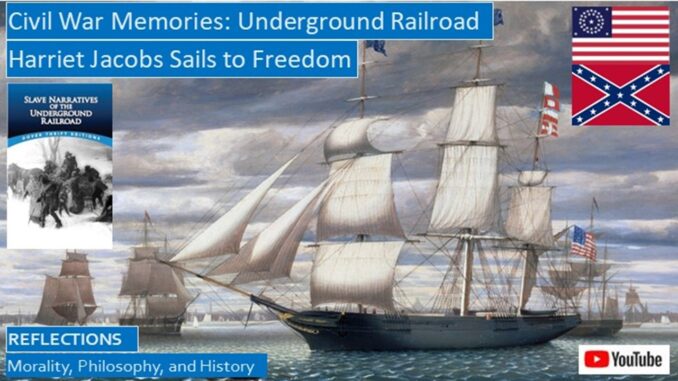
Harriet Jacobs, who also went by the name of Linda Brent, escaped from slavery when she was 21 years old, as she could no longer endure enslavement, or the sexual abuse many young female slaves were forced to endure that was the slave woman’s particular torment.
Harriet’s master posted this: “$300 REWARD! Ran away from the subscriber, an intelligent, bright, mulatto girl, named Linda, 21 years of age.” “She can read and write, and in all probability will try to get to the Free States.” Perhaps she changed her name after she escaped, so slave catchers could not track her down.
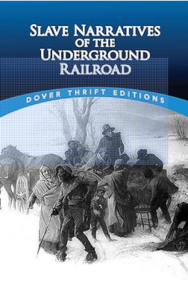 Since she was a mulatto, quite likely her mother was also raped by one of her white masters. We have two other mulatto slave stories, both Booker T Washington and Frederick Douglass were born to slaves who were raped by a white master, who never recognized them as their children. Augustine Tolton, the first admitted slave who became a priest, had two slave parents, his Catholic master was somewhat kinder, as Catholics were not as likely to split up slave families, and even had their children recorded in the parish registries. But, both Frederick Douglass and Mother Tolton with her son escaped from slavery, but Booker T Washington was freed after the end of the Civil War under Emancipation.
Since she was a mulatto, quite likely her mother was also raped by one of her white masters. We have two other mulatto slave stories, both Booker T Washington and Frederick Douglass were born to slaves who were raped by a white master, who never recognized them as their children. Augustine Tolton, the first admitted slave who became a priest, had two slave parents, his Catholic master was somewhat kinder, as Catholics were not as likely to split up slave families, and even had their children recorded in the parish registries. But, both Frederick Douglass and Mother Tolton with her son escaped from slavery, but Booker T Washington was freed after the end of the Civil War under Emancipation.
YouTube video for this blog: https://youtu.be/3KMkAyg7goY
Frederick Douglass Tells Us About His Life as a Slave in his Autobiography
http://www.seekingvirtueandwisdom.com/frederick-douglass-tells-us-about-his-life-as-a-slave-in-his-autobiography/
https://youtu.be/7VkzhyNnuQk
Life and Times of Frederick Douglass, After Slavery as an Abolitionist
http://www.seekingvirtueandwisdom.com/life-and-times-of-frederick-douglass-after-slavery-as-an-abolitionist/
https://youtu.be/M0sx85oMRQA
Father Augustine Tolton, From Slave to Priest
http://www.seekingvirtueandwisdom.com/father-augustine-tolton-from-slave-to-priest/
https://youtu.be/dZbzWJkAf5k
Up From Slavery: Autobiography of Booker T Washington
http://www.seekingvirtueandwisdom.com/up-from-slavery-autobiography-of-booker-t-washington/
https://youtu.be/yxDnJ6sBoJc
For more book links, see: https://www.slideshare.net/BruceStrom1/underground-railroad-harriet-jacobs-sspdf
In her 1861 autobiography, Incidents in the Life of a Slave Girl, Harriet Jacobs recounts her experiences, spreading the awful truth about slavery. “I can testify,” she writes, “from my own experiences and observations, that slavery is a curse to the whites as well as to the blacks. It makes the white fathers cruel and sensual; the sons violent and licentious; it contaminates the daughters, and makes the wives wretched. And as for the colored race, it needs an abler pen than mine to describe the extremity of their sufferings, the depth of their degradation.”[1]
INITIAL ATTEMPT TO ESCAPE SLAVERY
One day, Harriet Jacobs had enough, perhaps she was being mistreated, perhaps her master sought to rape her once again, perhaps the overseer had whipped her for no reason. She hid in the cabin of a friend, but when someone was approaching the cabin at night, she ran out and hid in the bushes.
Harriet remembers, “Suddenly, a reptile of some kind seized my leg. In my fright, I struck a blow which loosened its hold, but I could not tell whether I had killed it; it was so dark, I could not see what it was; I only knew it was something cold and slimy. The pain I felt soon indicated that the bite was poisonous.”
“I was compelled to leave my place of concealment, and I groped my way back into the house.” “My friend asked an old woman, who doctored among the slaves, what was good for the bite of a snake or a lizard. She told her to steep a dozen coppers in vinegar, overnight, and apply the cankered vinegar to the inflamed part.”
Harriet Jacobs remembers, “I had succeeded in cautiously conveying some messages to my relatives. They were harshly threatened, and despairing of my having a chance to escape, they advised me to return to my master, ask his forgiveness, and let him make an example of me. But such counsel had no influence on me. When I started upon this hazardous undertaking, I had resolved that, come what would, there should be no turning back. ‘Give me liberty, or give me death,’ was my motto.”
“When my friend contrived to make known to my relatives the painful situation I had been in for twenty-four hours, they said no more about my going back to my master. Something must be done, and that speedily; but where to turn for help, they knew not. God in his mercy raised up ‘a friend in need.’”
Harriet, aka Linda, remembers, “The husband,” Dr Flint, “held many slaves and bought and sold slaves. His wife also held a number in her own name; but she treated them kindly and would never allow any of them to be sold. She was unlike the majority of slaveholders’ wives.” “She listened attentively to the details of my story and sat thinking for a while. At last, she said, ‘Aunt Martha, I pity you both. If you think there is any chance of Linda’s getting to the Free States, I will conceal her for a time. But first you must solemnly promise that my name shall never be mentioned. If such a thing should become known, it would ruin me and my family. No one in my house must know of it, except the cook.” “It is a great risk; but I trust no harm will come of it. Get word to Linda to be ready as soon as it is dark before the patrols are out. I will send the housemaids on errands, and Betty shall go to meet Linda.’”
This was extremely rare, for the wife of a slaveholder to assist one of their slaves to escape!
Harriet Jacobs remembers, “The place where we were to meet was designated and agreed upon. My grandmother was unable to thank the lady for this noble deed; overcome by her emotions, she sank on her knees and sobbed like a child.” “Her first words were: ‘Honey, now you is safe. Dem devils ain’t coming to search dis house. When I get you into missis’ safe place, I will bring some nice hot supper. I specs you need it after all dis skeering.’”
She continues, “The mistress came to meet us and led me upstairs to a small room over her own sleeping apartment. “You will be safe here, Linda,” said she; “I keep this room to store away things that are out of use.” “You must be very careful, for my sake as well as your own; and you must never tell my secret; for it would ruin me and my family.” “Keep up your courage. I hope this state of things will not last long.” Betty came with the ‘nice hot supper,’ and the mistress hastened downstairs to keep things straight till she returned. How my heart overflowed with gratitude! Words choked in my throat; but I could have kissed the feet of my benefactress. For that deed of Christian womanhood may God forever bless her!”
Harriet Jacobs remembers, “Suddenly I heard a voice that chilled my blood. The sound was too familiar to me, it had been too dreadful, for me not to recognize at once my old master. He was in the house, and I at once concluded that he had come to seize me. I looked round in terror. There was no way of escape. The voice receded.”
“After a while I heard approaching footsteps; the key was turned in my door. I braced myself against the wall to keep from falling. I ventured to look up, and there stood my kind benefactress. I was too much overcome to speak and sunk down upon the floor.”
“I thought you would hear your master’s voice,” she said; “and knowing you would be terrified, I came to tell you there is nothing to fear.” “He is so sure you are in New York, that he came to borrow five hundred dollars to go in pursuit of you. My sister had some money to loan on interest. He has obtained it and proposes to start for New York tonight. So, for the present, you see you are safe.”
ESCAPE BEING FUTILE, HARRIET HIDES FOR SEVEN YEARS
Shortly afterwards, she was told that she would begin her escape. Harriet remembers, “At the gate I found Peter, a young colored man, waiting for me. I had known him for years.” “I was not afraid to trust him.” “’Take courage, Linda,’ said my friend Peter. ‘I’ve got a dagger, and no man shall take you from me, unless he passes over my dead body.’”
Harriet recalls, “It was a long time since I had taken a walk out of doors, and the fresh air revived me. It was also pleasant to hear a human voice speaking to me above a whisper. I passed several people whom I knew, but they did not recognize me in my disguise. I prayed internally that, for Peter’s sake, as well as my own, nothing might occur to bring out his dagger.” They “rowed out to a vessel not far distant and hoisted me on board.”
“We three were the only occupants of the vessel. I now ventured to ask what they proposed to do with me. They said I was to remain on board till near dawn, and then they would hide me in Snaky Swamp, till my uncle Phillip had prepared a place of concealment for me.”
Evidently our Harriet had not gotten over her snakebite, the hiding place in the swamp was too infested with snakes, and they discovered that the boats sailing north were still being searched, so they decided to hide her in her grandmother’s house for a time, which stretched out for many weeks, then for many months, then for many years.
Our Harriet remembers, “A small shed had been added to my grandmother’s house years ago. Some boards were laid across the joists at the top, and between these boards and the roof was a very small garret, never occupied by anything but rats and mice.” “The highest part was three feet high and sloped down abruptly to the loose board floor. There was no admission for either light or air. My uncle Philip, who was a carpenter, had very skillfully made a concealed trap door, which opens up to the storeroom.” “The air was stifling, the darkness total. A bed had been spread on the floor. I could sleep quite comfortably on one side; but the slope was so sudden that I could not turn on the other without hitting the roof. The rats and mice ran over my bed; but I was weary, and I slept such sleep as the wretched may, when a tempest has passed over them. Morning came. I knew it only by the noises I heard; for in my small den day and night were all the same.” “But I was not comfortless. I heard the voices of my children.”
Harriet remembers her many years as a slave, how she was not mistreated until Dr Flint became her master. “I was never cruelly over-worked; I was never lacerated with the whip from head to foot; I was never so beaten and bruised that I could not turn from one side to the other; I never had my heel-strings cut to prevent my running away; I was never chained to a log and forced to drag it about, while I toiled in the fields from morning till night; I was never branded with hot iron, or torn by bloodhounds.” We can presume that many of these things did happen to her when Dr Flint became her master.
Harriet continues, “On the contrary, I had always been kindly treated, and tenderly cared for, until I came into the hands of Dr. Flint. I had never wished for freedom till then. But though my life in slavery was comparatively devoid of hardships, God pity the woman who is compelled to lead such a life!”
Harriet remembers how she spent her days in hiding. “My food was passed up to me through the trapdoor my uncle had contrived; and my grandmother, my uncle Phillip, and aunt Nancy would seize such opportunities as they could, to mount up there and chat with me at the opening. But of course, this was not safe in the daytime. It must all be done in darkness.” She found a tool she used to drill several holes so she could see her children.
Harriet remembers, “My condition was now a little improved. But for weeks I was tormented by hundreds of little red insects, fine as a needle’s point, that pierced through my skin, and produced an intolerable burning. The good grandmother gave me herb teas and cooling medicines, and finally I got rid of them. The heat of my den was intense, for nothing but thin shingles protected me from the scorching summer’s sun. But I had my consolations. Through my peeping-hole I could watch the children, and when they were near enough, I could hear their talk.”
Harriet rues, “Dr. Flint and his family repeatedly tried to coax and bribe my children to tell him something they had heard said about me. One day the doctor took them into a shop and offered them some bright little silver pieces and gay handkerchiefs if they would tell where their mother was.” Benny said, “‘Dr. Flint, I don’t know where my mother is. I guess she’s in New York; and when you go there again, I wish you’d ask her to come home, for I want to see her; but if you put her in jail, or tell her you’ll cut her head off, I’ll tell her to go right back.’”
FINALLY, HARRIET PREPARES TO ESCAPE
Harriet recalls, “I hardly expect that the reader will credit me, when I affirm that I lived in that little dismal hole, almost deprived of light and air, and with no space to move my limbs, for nearly seven years.” “Countless were the nights that I sat late at the little peep hole scarcely large enough to give me a glimpse of one twinkling star. There, I heard the patrols and slave-hunters conferring together about the capture of runaways, well knowing how rejoiced they would be to catch me.”
Harriet adds, “I was to escape in a vessel; but I forbear to mention any further particulars.” “I made all my arrangements to go on board as soon as it was dusk. The intervening time I resolved to spend with my son. I had not spoken to him for seven years, though I had been under the same roof, and seen him every day, when I was well enough to sit at the peep hole. I did not dare to venture beyond the storeroom; so they brought him there, and locked us up together, in a concealed place.” “After we had talked and wept together for a little while, he said, ‘Mother, I’m glad you’re going away. I wish I could go with you. I knew you was here; and I have been so afraid they would come and catch you!’”
Harriet was greatly surprised and asked him how he had found it out. He replied, “I was standing under the eaves, one day, before Ellen went away, and I heard somebody cough.” “I don’t know what made me think it was you, but I did think so.”
“I told him I was now really going to the Free States, and if he was a good, honest boy, and a loving child to his dear old grandmother, the Lord would bless him, and bring him to me, and we would live together.” She wrote her slave autobiography in 1861, quite likely she was able to reunite with her children when they were emancipated after the end of the Civil War.
“As the hour approached for me to leave, I again descended to the storeroom. My grandmother and Benny were there. She took me by the hand, and said, ‘Linda, let us pray.’ We knelt down together, with my child pressed to my heart, and my other arm round the faithful, loving old friend I was about to leave forever.”
NORTHWARD BOUND TO FREEDOM
Harriet recalls, “Peter was waiting for me in the street. I was soon by his side, faint in body, but strong of purpose. I did not look back upon the old place, though I felt that I should never see it again.” “I never could tell how we reached the wharf. My brain was all of a whirl, and my limbs tottered under me. At an appointed place we met my uncle Phillip, who had started before us on a different route, that he might reach the wharf first, and give us timely warning if there was any danger. A rowboat was ready.”
Harriet remembers, “When I entered the vessel, the elderly, kind captain came forward to meet me.” “He showed me to a tiny cabin, where sat my friend Fanny,” who was also escaping slavery. “She gazed at me in utter astonishment, and exclaimed, ‘Linda, can this be you? or is it your ghost?’ When we were locked in each other’s arms, my overwrought feelings could no longer be restrained. My sobs reached the ears of the captain, who came and very kindly reminded us, that for his safety, as well as our own, it would be prudent for us not to attract any attention. He said that when there was a sail in sight, he wished us to keep below; but at other times, he had no objection to our being on deck.”
Harriet reminisces, “Fanny and I now talked by ourselves, low and quietly, in our little cabin. She told me of the sufferings she had gone through in making her escape, and of her terrors while she was concealed in her mother’s house. Above all, she dwelt on the agony of separation from all her children on that dreadful auction day. She could scarcely believe me when I told her where I had been hiding for nearly seven years. ‘We have the same sorrows,’ said I. ‘No,’ replied she, ‘you are going to see your children soon, and there is no hope that I shall ever even hear from mine again.’”
After the end of the Civil War, members of many families who had been split up on the auction block took out classified ads in the negro publications searching for their loved one whom they had not heard from in many years. Very few of these family members were able to reconnect.
Harriet recalls, “The captain soon came to advise us to go on deck for fresh air.” “He told us he was a Southerner by birth and had spent the greater part of his life in the Slave States, and that he had recently lost a brother who traded in slaves. ‘But’ said he, ‘it is a pitiable and degrading business, and I always felt ashamed to acknowledge my brother was a part of it.’”
“Ten days after we left land, we were approaching Philadelphia. The captain said we should arrive there in the night, but he thought we had better wait till morning, and go on shore in broad daylight, as the best way to avoid suspicion.”
Harriet awakens: “The next morning, I was on deck as soon as the day dawned. I called Fanny to see the sunrise, for the first time in our lives, on free soil.” “We watched the reddening sky, and saw the great orb come up slowly out of the water.” “We had escaped from slavery, and we supposed ourselves to be safe from the hunters. But we were alone in the world, and we had left dear ties behind us; ties cruelly sundered by the demon Slavery.”
FREED WOMEN IN PHILADELPHIA, THEN NEW YORK
Harriet recalls, “We were placed in a rowboat, and in about fifteen minutes were landed on a wood wharf in Philadelphia. As I stood looking round, the friendly captain touched me on the shoulder, and said, ‘There is a respectable-looking colored man behind you. I will speak to him about the New York trains and tell him you wish to go directly on.’”
She remembers, “I made my way back to the wharf, where the captain introduced me to the colored man, as the Rev. Jeremiah Durham, minister of Bethel church. He took me by the hand, as if I had been an old friend. He told us we were too late for the morning cars to New York, and must wait until the evening, or the next morning. He invited me to go home with him, assuring me that his wife would give me a cordial welcome; and for my friend he would provide a home with one of his neighbors. I thanked him for so much kindness to strangers.”
“Mr Durham insisted that I should dine with him, and then he would assist me in finding my friends. The sailors came to bid us goodbye. I shook their hardy hands, with tears in my eyes. They had all been kind to us, and they had rendered us a greater service than they could possibly conceive of.” “I had never seen so large a city or been in contact with so many people in the streets. It seemed as if those who passed by looked at us with an expression of curiosity.”
Harriet reminisces, “Mrs. Durham, her face all beaming with kindness, said there was an anti-slavery friend downstairs who would like to see me.” I overcame my dread of encountering strangers and went with her.” “The anti-slavery friend had come to inquire into my plans, and to offer assistance, if needed.” “Fanny was comfortably established, for the present, with a friend of Mr. Durham. The Anti-Slavery Society agreed to pay our expenses to New York.”
Harriet continues, “We were urged to remain in Philadelphia a few days, until some suitable escort could be found for us. I gladly accepted the proposition, for I had a dread of meeting slaveholders, and some dread also of railroads. I had never entered a railroad car in my life, and it seemed to me quite an important event.”
Harriet recalls, “When Mr. Durham handed us our tickets, he said, ‘I am afraid you will have a disagreeable ride, but I could not procure tickets for the first-class cars.’” “We were stowed away in a large, rough car, with windows on each side, too high for us to look out without standing up. It was crowded with people, apparently of all nations. There were plenty of beds and cradles, containing screaming and kicking babies. Every other man had a cigar or pipe in his mouth, and jugs of whiskey were handed round freely. The fumes of the whiskey and the dense tobacco smoke were sickening to my senses, and my mind was equally nauseated by the coarse jokes and ribald songs around me. It was a very disagreeable ride.”
After Harriet arrived in New York, she stayed at the house of the Bruce family. Apparently, she was their house servant, but she was free to come and go as she pleased. Soon after she arrived in New York, the Fugitive Slave Law was enacted. Under this law, often slavecatchers would not only catch former slaves; they would also kidnap any blacks they could find. Many blacks who had lived as freedmen in New York for decades fled further into Canada. Thus, when she ran errands for the family, such as going to the store, she took the back alleys and side streets as much as possible.
Harriet remembers, “All that winter I lived in a state of anxiety.” “I was, in fact, a slave in New York, as subject to slave laws as I had been in a Slave State. Strange incongruity in a state called free!”[2]
[1] Harriet Jacobs, Incidents in the Life of a Slave Girl (Mineola, New York, Dover Publications, 2001, 1861), Chapter 9, p. 46. This is the full-length story.
[2] Harriet Jacobs, Incidents in the Life of a Slave Girl, included in Slave Narratives of the Underground Railroad (Garden City, New York, Dover Publications, 2001, 1861), pp. 119-138.

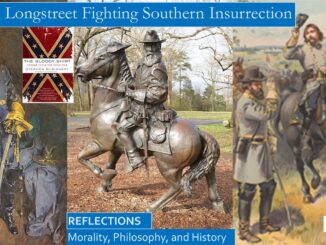
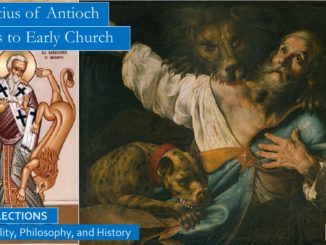
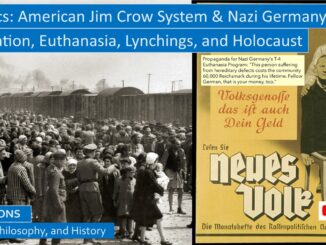
3 Trackbacks / Pingbacks